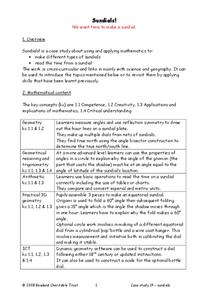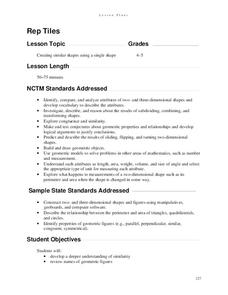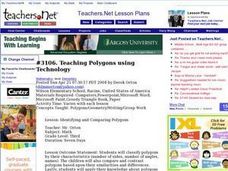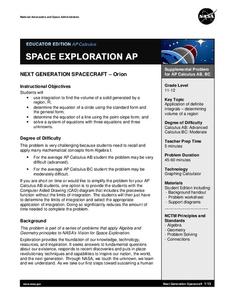Bowland
Sundials!
Time to learn about sundials. Scholars see how to build sundials after learning about Earth's rotation and its relation to time. The unit describes several different types of possible sundials, so choose the one that fits your needs — or...
Curated OER
This House is Made of Mud: Exploring the Shapes in Our Lives
Students study about our dependence on the earth's resources for materials. They practice their knowledge of geometric shapes by recognizing them in the context of the story.
Virginia Department of Education
Constructions
Pupils learn the steps for basic constructions using a straightedge, a compass, and a pencil. Pairs develop the skills to copy a segment and an angle, bisect a segment and an angle, and construct parallel and perpendicular lines.
Pyro Innovations
Get into Shape
Shapes are so fun! Little ones explore, identify, and create shapes using tangrams or pattern blocks. The activity is intended to stimulate critical thinking while engaging learners through play and shape identification. Each child will...
Improving Measurement and Geometry in Elementary Schools
Rep Tiles
In addition to the catchy title, this lesson plan provides upper graders an opportunity to more closely scrutinize the attributes of plane figures. In particular, they focus on the similarity of different shapes. Both whole-class and...
Curated OER
Investigating the Idea of Tan
Fifth graders use tan to solve problems involving right-angled triangles. They solve equations of the form tan(8) =a, for a between 180 degrees and 360 degrees. They state the value of tan (8) in special cases.
Arizona State University
Roundup Shapes
Let's study 2-D shapes! Young mathematicians compare and classify shapes according to attributes. They evaluate shape riddles and predict the shape being described. Here is the website where you can find the...
Curated OER
Shapes in Our World
Help your students explore shapes. They classify shapes and identify them in their everyday world. Plane shapes are explored, and they classify and identify the plane shapes.
Curated OER
Volume of a Cylinder
Middle and high schoolers calculate the volume of cylinders. They measure the height, radius and diameter of cylinders. Following given formulas, learners calculate the area and volume of the cylinder. They compare cylinders and predict...
Curated OER
Property Lists for Quadrilaterals
Young scholars establish classifications of shapes by various properties (angles, sides, etc.). They introduce the important properties of common shapes. Students develop an awareness of the wide variety of ways the 2-D shapes can be alike.
Curated OER
Volume and Surface Area
Students explore volume and surface area. In this math instructional activity, students fill boxes with cubes to identify the volume of the boxes. Students discuss area.
Curated OER
Triangle Inequality Theorem
High schoolers investigate the relationship between angle measures and sides of a triangle and the relationships among the three sides of a triangle. The use of technology (Cabri, Jr.) allows learners to make and test conjectures as they...
Curated OER
Shapes
Students practice identifying spheres, triangles, and rectangles and the difference between plane shapes and space shapes. They identify shapes in the classroom and complete activity sheets.
Curated OER
Embossed Rose Window Designs
Young scholars, after researching the history and foundation of Renaissance rose windows, access ArtEmboss to create an original window design. They employ a basic metalworking technique utilizing a soft metal. The design created...
Curated OER
What are the Kinds of Triangles?
Fifth graders classify triangles. In this triangle lesson, 5th graders learn about the characteristics that make up a triangle. They are instructed through video, PowerPoint slides, and teacher-led demonstrations.
Curated OER
Automobile-Accident Reconstruction
Students investigate an accident and relate it to math. In this trigonometry lesson, students measure the accident scene, the friction produced, and the speed from the skid marks. They create a poster of their findings.
Curated OER
Literacy Activity: Mouse Shapes
Young scholars listen to the book Mouse Shapes and identify the shapes in the book as it is being read. In this shapes lesson, students identify the shapes in the book, and then play with cut out shapes that they can hold in their hands.
Curated OER
Geoboard Squares
Students create squares of different sizes on a geoboard. They find and describe a pattern. Students use the pattern to determine the number of squares possible on a 10-by-10 geoboard. They create squares with a horizontal base (and...
Curated OER
Teaching Polygons using Technology
Third graders utilize different types of computer programs, such as Microsoft paint and Microsoft Word to study and create different types of polygons. They use PowerPoint to create a story about a shape and others that it meets during a...
Curated OER
Hello My Name is . . . Helvetica
Students play various games to help create a classroom community. In this name recognition lesson, students combine their name recognition skills with newly learned art and geometric vocabulary. First students discover vocabulary that...
Curated OER
Let's Learn about Symmetry
Students explore symmetry in architecture. In this cross curriculum art and architecture lesson plan, students fold paper to illustrate symmetry and identify symmetrical and asymmetrical shapes. Students observe photographs or take a...
Curated OER
Rep Tiles
Third graders use pattern blocks of one shape at a time to try to create a similar shape. They compare the perimeter of the new figure with the perimeter of the original shape and look for a pattern. Students use the pattern to predict...
Curated OER
Exploration with Geometric Solids
Students reinforce geometric concepts by playing "Guess My Solid." Through a process of elimination, they determine the shapes of mystery solids. Finally, students use various materials to construct their own geometric figures.
Curated OER
NEXT GENERATION SPACECRAFT-Orion
Students investigate the volume of a solid. In this calculus lesson, students use integration to find the volume of a solid generated by a region, the Orion crew module.


